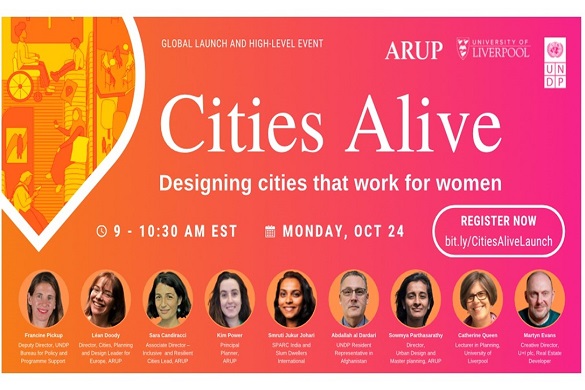Design cities to work better for women, urges new report
Published on

University of Liverpool planners have contributed to a new report, launched today, that calls for urgent action to remove the gender bias built into cities and improve women’s safety, their health, and access to education and employment.
The `Cities Alive: Designing Cities that Work for Women' report, published by ARUP and the United Nations Development Programme, shows that while women make up half the global urban population, cities have not been designed with them in mind. It calls on decision-makers, urban designers, and city planners to work towards cities that are more inclusive, safer, and equitable for women around the world.
The report examines everything from street lighting to women’s involvement in urban planning. It gives city designers, planners, and authorities the tools to better engage and address women’s needs in their cities, including how to create and finance gender responsive urban projects.
It draws on the voices and experiences of women globally, as well as a thorough review of data and research, to identify issues and recommendations based on the four critical themes: safety and security, justice and equity, health and wellbeing and enrichment and fulfilment.
Dr Catherine Queen, a Lecturer in Planning at the University of Liverpool provided a technical review role for the report. She also worked with Masters students from the MA Housing and Community Planning course, who contributed to the discussions with Arup around methodology and scope. The outputs from the MA contributed to the report’s evidence base through authentic assessments submitted as part of the students’ coursework.
Dr Queen said: ”This report represents technical input from myself and two Masters in Planning students, who were able to apply their skills and knowledge from theory and practice led course work to this real life planning project. This is invaluable experience for our students which they will be able to draw from in their future careers and which accords with the University’s Curriculum 2021 by specifically focussing on the equality impact of the assignment and considering how planning is currently experienced by a range of groups who identify as women, with an emphasis on intersectionality.”
The report is being launched at 2pm today (Monday, 24 October) at a webinar event marking UN ‘World Habitat Day’ with Dr Queen participating alongside representatives drawn from different sectors including local government, civil society and the private sector.
You can register for the event here.
The findings show that a limited voice in urban design decisions for women can exacerbate and perpetuate inequalities in cities, backed up by existing global statistics and research. Major issues include sexual harassment in public spaces, reflected by the experiences of 97% of women aged 18-24 in the UK, and a lack of access to suitable facilities, with one third of women globally not having access to adequate toilets. The gender bias built into cities is also reflected in honoring the heroes of the past and the present through public monuments, with only 2-3% of statues representing women across the world. And women are not well represented in key decisions that affect the future environment for all, with only around one in seven environmental sector ministries worldwide being led by women.
The new report argues that while barriers to women entering city planning, construction, and leadership positions urgently need to be removed, more needs to be done to reach those influencing how cities are designed now, to show them the importance of gender responsiveness and how to embed it into their work.
Focused on solutions, the report recommends that decision makers and urban practitioners should be given the tools they need to move beyond mere consultation, and actively involve women at every stage of city design and planning – from inception to delivery. Importantly, the report also shows that accelerating the participation of women in urban governance at all levels is a prerequisite for better functioning cities, as cities that work better for women are more resilient and inclusive for all.
UNDP Administrator Achim Steiner. siad: "Achieving gender equity is integral to each of the UN Sustainable Development Goals. When cities are largely designed without considering the diverse needs and insights of women of all ages and identities– this can have an adverse impact not only on their lives, but on their families. It restricts their opportunities and negatively impacts the overall sustainable development of societies. Gender-equal cities can generate enormous economic, environmental, political, and social benefits."
Léan Doody, the European Director of Cities, Planning and Design at Arup, added: "The gender bias built into the design of cities has had a negative effect on the lives of women around the world. We are calling on urban designers and planners to use this report’s recommendations to meet women’s needs in cities now, while working to bring more women into leadership roles,”
The recommendations examine all women’s needs and aspirations, as well as safety, showing how issues like gender-based discrimination, lack of access to quality education and employment opportunities, or housing and essential infrastructure, negatively affect women. It also demonstrates that the gender bias built into cities impacts our ability to tackle climate change, with women facing disproportionate exposure to climate hazards.